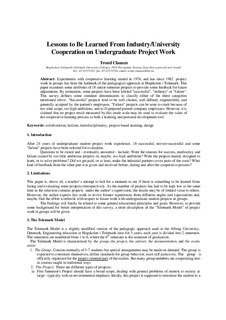| dc.description.abstract | Experiments with cooperative learning started in 1976, and has since 1982 project work in groups has been the hallmark of the pedagogical approach at Hogskolen i Telemark. This paper examines some attributes of 18 senior semester projects to provide some feedback for future adjustments. By estimation, some projects have been labeled "successful", "ordinary" or "failure". This survey defines some common denominators to classify either of the three categories mentioned above. "Successful" projects tend to be well chosen, well defined, engineerable, and generally accepted by the partner's employees. "Failure" projects can be seen to crash because of too wide scope, too high ambitions, and to ill prepared partner company employees. However, it is claimed that no project result measured by this crude scale may be used to evaluate the value of the cooperative learning process as both a learning and personal development tool. | |
